
Donald Trump campaigned for the presidency as the “law-and-order” candidate — a leader who would make life harder for criminals (and suspected criminals), and easier for America’s embattled law enforcement officers.
In one sense, Trump has made good on this promise: When African-Americans’ basic civil liberties and the freedom of individual cops to “fight crime” as they see fit have come into conflict, the Trump administration has prioritized the latter. Earlier this year, Attorney General Jeff Sessions announced that the Justice Department would scale back investigations into civil-rights abuses by American police departments, even though previous investigations had revealed that police departments in Chicago, Ferguson, and Baltimore routinely violated the rights of their black constituents.
Still, there is a limit to the Trump administration’s fealty to the police. And when the financial interests of gun manufacturers have been at odds with the safety of American cops, the White House has sided with the arms merchants.
The United States does not have a whole lot of restrictions on who can purchase firearms. Still, the Brady Handgun Prevention Act stipulates that when a gun dealer runs a background check, and finds that a would-be customer is a “fugitive from justice,” they can’t sell that person a gun. But there’s been a decade-long dispute between the FBI and the Bureau of Alcohol, Tobacco, Firearms and Explosives about who, precisely, counts as a fugitive.
The FBI has argued that anyone with an outstanding warrant is a fugitive, at least for the purposes of the Brady law. The ATF has insisted that only people with outstanding warrants who have crossed state lines to avoid prosecution are fugitives. Earlier this year, the Trump Justice Department took the ATF’s side — and drastically narrowed the category of suspected criminals who are legally barred from purchasing firearms.
This week, the the Atlanta Journal-Constitution obtained FBI records that document the far-reaching consequences of this administrative change:
Although the revision has only been in effect for six months, there has already been a noticeable dip in the number of gun sales denied because the potential buyer was a “fugitive from justice.” According to NICS data, there was an 80 percent decline, compared to the same period in 2016.
…The FBI records show that 518,670 names have been removed from the nationwide background check database, meaning those individuals would not automatically be banned from obtaining a gun.
Nationwide, there were 1,581 gun sales or carry permits sought by fugitives that were declined between March and August in 2016; 18 percent of all denials. This year, there were 321 denials based on entries in the “fugitive from justice” category in NICS, or 4 percent of all denials nationwide.
“I cannot believe this has happened,” Vernon Keenan, the director of the Georgia Bureau of Investigation, told the paper. “I told them this is a problem.”
Blue lives matter to this White House. But apparently, ensuring that suspected criminals can purchase assault weapons — even while evading active warrants for their arrest — matters just a little bit more.






























